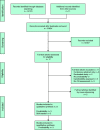Virtual reality simulation in robot-assisted surgery: meta-analysis of skill transfer and predictability of skill
- PMID: 33864069
- PMCID: PMC8052560
- DOI: 10.1093/bjsopen/zraa066
Virtual reality simulation in robot-assisted surgery: meta-analysis of skill transfer and predictability of skill
Abstract
Background: The value of virtual reality (VR) simulators for robot-assisted surgery (RAS) for skill assessment and training of surgeons has not been established. This systematic review and meta-analysis aimed to identify evidence on transferability of surgical skills acquired on robotic VR simulators to the operating room and the predictive value of robotic VR simulator performance for intraoperative performance.
Methods: MEDLINE, Cochrane Central Register of Controlled Trials, and Web of Science were searched systematically. Risk of bias was assessed using the Medical Education Research Study Quality Instrument and the Newcastle-Ottawa Scale for Education. Correlation coefficients were chosen as effect measure and pooled using the inverse-variance weighting approach. A random-effects model was applied to estimate the summary effect.
Results: A total of 14 131 potential articles were identified; there were eight studies eligible for qualitative and three for quantitative analysis. Three of four studies demonstrated transfer of surgical skills from robotic VR simulators to the operating room measured by time and technical surgical performance. Two of three studies found significant positive correlations between robotic VR simulator performance and intraoperative technical surgical performance; quantitative analysis revealed a positive combined correlation (r = 0.67, 95 per cent c.i. 0.22 to 0.88).
Conclusion: Technical surgical skills acquired through robotic VR simulator training can be transferred to the operating room, and operating room performance seems to be predictable by robotic VR simulator performance. VR training can therefore be justified before operating on patients.
© The Author(s) 2021. Published by Oxford University Press on behalf of BJS Society Ltd.
Figures



References
-
- Sood A, Jeong W, Peabody JO, Hemal AK, Menon M. Robot-assisted radical prostatectomy: inching toward gold standard. Urol Clin North Am 2014;41:473–484 - PubMed
-
- Diana M, Marescaux J. Robotic surgery. Br J Surg 2015;102:e15–e28 - PubMed
-
- Intuitive Surgical. Annual Report 2018. http://www.annualreports.com/Company/intuitive-surgical-inc (accessed 20 February 2020)
-
- Zhou NX, Chen JZ, Liu Q, Zhang X, Wang Z, Ren S et al. Outcomes of pancreatoduodenectomy with robotic surgery versus open surgery. Int J Med Robotics Comput Assist Surg 2011;7:131–137 - PubMed
-
- Kowalewski KF, Schmidt MW, Proctor T, Pohl M, Wennberg E, Karadza E et al. Skills in minimally invasive and open surgery show limited transferability to robotic surgery: results from a prospective study. Surg Endosc 2018;32:1656–1667 - PubMed
Publication types
MeSH terms
LinkOut - more resources
Full Text Sources
Other Literature Sources

